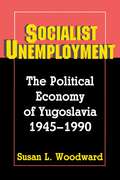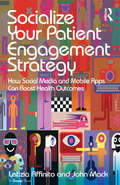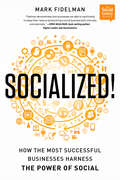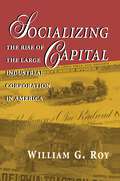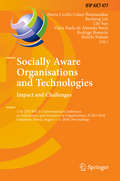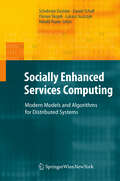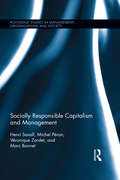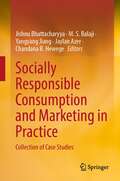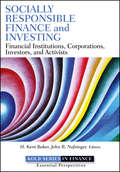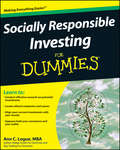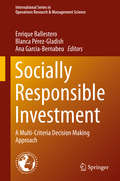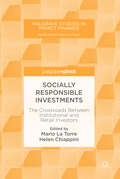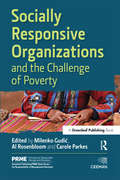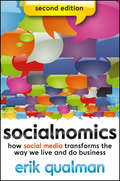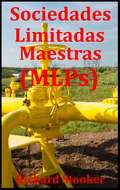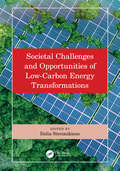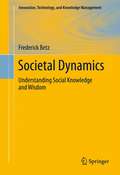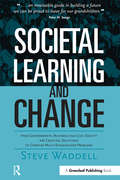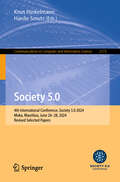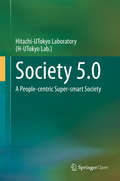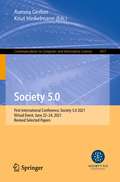- Table View
- List View
Socialist Unemployment: The Political Economy of Yugoslavia, 1945-1990
by Susan L. WoodwardIn the first political analysis of unemployment in a socialist country, Susan Woodward argues that the bloody conflicts that are destroying Yugoslavia stem not so much from ancient ethnic hatreds as from the political and social divisions created by a failed socialist program to prevent capitalist joblessness. Under Communism the concept of socialist unemployment was considered an oxymoron; when it appeared in postwar Yugoslavia, it was dismissed as illusory or as a transitory consequence of Yugoslavia's unorthodox experiments with worker-managed firms. In Woodward's view, however, it was only a matter of time before countries in the former Soviet bloc caught up with Yugoslavia, confronting the same unintended consequences of economic reforms required to bring socialist states into the world economy. By 1985, Yugoslavia's unemployment rate had risen to 15 percent. How was it that a labor-oriented government managed to tolerate so clear a violation of the socialist commitment to full employment? Proposing a politically based model to explain this paradox, Woodward analyzes the ideology of economic growth, and shows that international constraints, rather than organized political pressures, defined government policy. She argues that unemployment became politically "invisible," owing to its redefinition in terms of guaranteed subsistence and political exclusion, with the result that it corrupted and ultimately dissolved the authority of all political institutions. Forced to balance domestic policies aimed at sustaining minimum standards of living and achieving productivity growth against the conflicting demands of the world economy and national security, the leadership inadvertently recreated the social relations of agrarian communities within a postindustrial society.
Socialize Your Patient Engagement Strategy: How Social Media and Mobile Apps Can Boost Health Outcomes
by John Mack Letizia AffinitoSocialize Your Patient Engagement Strategy makes the case for a fundamentally new approach to healthcare communication; one that mobilizes patients, healthcare professionals and uses new media to enable gathering, sharing and communication of information to achieve patient-centricity and provide better value for both organizations (in terms of profit) and patients (in terms of better service and improved health). Letizia Affinito and John Mack focus on three priority areas for actions: Improving Health Literacy (e.g. web sites; targeted mass digital campaigns), Improving Self-care (e.g. self-management education; self-monitoring; self-treatment), Improving Patient Safety (e.g. adherence to treatment regimens; equipping patients for safer selfcare). The authors explain the healthcare context to the digital communications revolution; the emerging digital marketing and communications techniques that enable this revolution and the core elements behind a patient-driven digital strategy. Drawing on the authors’ research and consulting practices, as well as on the practical experience of managers in medium-large companies worldwide, the book provides a proven framework for improving the development and implementation of patient-centered digital communication programs in healthcare organizations. It is an engaging how-to/how-not-to book which includes tips, advice, and critical reviews that every stakeholder dealing with the healthcare system must have in order to participate in the evolving healthcare system and be more active in making strategic patient-centered choices. Socialize Your Patient Engagement Strategy includes interviews with experts and leading case histories of successful digital communication programs in the healthcare arena. While there are books that focus on specific healthcare communicators within different types of organizations, in their book the authors recognize that effective patient-centric communication crosses all organizational boundar
Socialized!: How the Most Successful Businesses Harness the Power of Social
by Mark FidelmanMost companies today realize the imperative to connect with their customers, employees, and partners through social technologies--Facebook, Twitter, Google+, YouTube, and elsewhere. But a huge challenge is still in the way: how to build programs and teams for accomplishing all that. While organizations have been fixated on how to use the latest social tool, they've lost sight of how to create a talent pool capable of adjusting to the next wave of technology around the corner. For corporations to successfully transform into social business enterprises they must shift the focus from computers and tools to developing skills and attitudes around technology. Socialized! represents a "playbook" on how to create such a high-performing social enterprise. Filled with clear strategies and real-life stories from visionaries and change makers, the book is designed to help leaders motivate employees throughout the organization to adopt a "social" mindset, ensuring success against the competition.
Socializing Capital: The Rise of the Large Industrial Corporation in America
by William G. RoyEver since Adolph Berle and Gardiner Means wrote their classic 1932 analysis of the American corporation, The Modern Corporation and Private Property, social scientists have been intrigued and challenged by the evolution of this crucial part of American social and economic life. Here William Roy conducts a historical inquiry into the rise of the large publicly traded American corporation. Departing from the received wisdom, which sees the big, vertically integrated corporation as the result of technological development and market growth that required greater efficiency in larger scale firms, Roy focuses on political, social, and institutional processes governed by the dynamics of power. The author shows how the corporation started as a quasi-public device used by governments to create and administer public services like turnpikes and canals and then how it germinated within a system of stock markets, brokerage houses, and investment banks into a mechanism for the organization of railroads. Finally, and most particularly, he analyzes its flowering into the realm of manufacturing, when at the turn of this century, many of the same giants that still dominate the American economic landscape were created. Thus, the corporation altered manufacturing entities so that they were each owned by many people instead of by single individuals as had previously been the case.
Socially Aware Organisations and Technologies. Impact and Challenges
by Maria Cecilia Calani Baranauskas Kecheng Liu Lily Sun Vânia Paula de Almeida Neris Rodrigo Bonacin Keiichi NakataThis book constitutes the refereed proceedings of the 17th IFIP WG 8. 1 International Conference on Informatics and Semiotics in Organisations, ICISO 2016, held in Campinas, Brazil, in August 2016. The 16 full papers and 9 short papers presented were carefully reviewed and selected from 30 submissions. The papers are organized in the following topical sections: organisational semiotics: theory and research; semiotics of interactions and socially aware user interface design; digital business ecosystems; knowledge management and engineering; and trends, challenges and new issues in education, health and eScience systems.
Socially Enhanced Services Computing
by Daniel Schall Schahram Dustdar Florian Skopik Lukasz Juszczyk Harald PsaierSocially enhanced Services Computing deals with a novel and exciting new field at the intersection between Social Computing, Service-oriented Computing, Crowd Computing, and Cloud Computing. The present work presents a collection of selected papers by the editors of this volume, which they feel will help the reader in understanding this field. The approach discussed allows for a seamless integration of people into trusted dynamic compositions of Human-provided Services and Software-based services, thus empowering new interaction models and processes in massive collaboration scenarios in a Future Internet.
Socially Responsible Capitalism and Management (Routledge Studies in Management, Organizations and Society)
by Marc Bonnet Henri Savall Michel Péron Véronique ZardetIn the current crisis context, capitalism is questioned by its detractors or defended by its partisans. The concept of Socially Responsible Capitalism (SRC) is based on the entrepreneurial spirit. It encourages exemplary behaviors, such as effective, efficient and ethical behaviors, by stimulating social responsibility of companies and organizations. This is combined with the development of economic empowerment and legitimate efforts of each citizen-actor. Socially Responsible Capitalism and Management does not confuse financial capitalism and entrepreneurial capitalism. The first one improves the creation of artificial value which leads to financial bubbles that periodically burst and bankrupt the real economy. Quite the reverse, entrepreneurial capitalism creates both solid economic value and employment. This is justified by the production of goods and services that meet legitimate needs of consumer-citizens. This book shows that by putting Human Beings at the heart of action enables producing sustainable economic value, and anthropological values which are inseparable. The innovative aspect of this book lies in its analysis starting from the macro-economic level to the individual one, by presenting a detailed analysis of the micro-economic level of companies within its managerial issues. Socially Responsible Capitalism and Management is dedicated to present the different aspects of SRC for the Society, companies and organizations and also individual actors, as citizens, producers and consumers.
Socially Responsible Consumption and Marketing in Practice: Collection of Case Studies
by Jishnu Bhattacharyya M. S. Balaji Yangyang Jiang Jaylan Azer Chandana R. HewegeThe book provides an overview of socially responsible consumption and marketing, as well as a collection of teaching cases that discuss and emphasize how 21st-century organizations, both for-profit and non-profit, are addressing socially responsible consumers and meeting their changing needs while remaining profitable. Consumers, governments, academics, and practitioners are becoming more interested in promoting positive social changes through consumption. As a result, this book aims to understand the practice of marketing in bringing about positive social change through real-life case studies. Consumption by socially responsible consumers who care about the social good is unique, not only because of its inter-disciplinary and substantive subject matter but also because it presents challenges and pushes organizations to make significant changes in the ways they have been accomplishing organizational activities in the twenty-first century, from procurement to production to sales and services. The book goes beyond individual consumers and their lifestyles to promote the scope of discussing marketing strategies. It seeks to comprehend how people consume and how socially responsible consumption is conceived. The case studies present and pursue integrated solutions for more sustainable consumption. This is a must-read for marketers who want to reach out to socially responsible consumers.
Socially Responsible Finance And Investing
by H. Kent Baker John R. NofsingerA detailed look at the role of social responsibility in finance and investing The concept of socially responsible finance and investing continues to grow, especially in the wake of one of the most devastating financial crises in history. This includes responsibility from the corporate side (corporate social responsibility) as well as the investor side (socially responsible investing) of the capital markets. Filled with in-depth insights and practical advice, Socially Responsible Finance and Investing offers an important basis of knowledge regarding both the theory and practice of this ever-evolving area of finance. As part of the Robert W. Kolb Series in Finance, this book showcases contributed chapters from professionals and academics with extensive expertise on this particular subject. It provides a comprehensive view of socially responsible foundations and their applications to finance and investing as determined by the current state of research. Discusses many important issues associated with socially responsible finance and investing, like moral hazard and the concept of "too big to fail" Contains contributed chapters from numerous thought-leaders in the field of finance Presents comprehensive coverage starting with the basics and bringing you through to cutting-edge, current theory and practice Now more than ever, we need to be mindful of the social responsibilities of all investment practices. The recent financial crisis and recession has changed the financial landscape for years to come and Socially Responsible Finance and Investing is a timely guide to help us navigate this difficult terrain.
Socially Responsible Investing For Dummies
by Ann C. LogueGenerate a good return as well as goodwill with this guide to ethical investmentsWant to make money while you make a difference in the world? Socially Responsible Investing For Dummies, a 2010 Green Book Festival award winner, is as practical, hands-on guide to smart social investing that shows you how to maximize your profits while remaining true to your values. You get expert advice in targeting an issue you're passionate about, researching potential investments, and putting your socially responsible choices into action.Get started with social investing basics -- understand what it is, why it works, and how investors define social responsibilityNavigate the socially responsible enterprise -- discover the business principles that help ethical organizations thriveConduct your research -- determine whether an investment has financial potential and also serves your personal needsEvaluate your investment choices -- from stocks and bonds to mutual funds and ETFs to real estate and high finance, select the best investments and adjust your portfolio over timeGet help from the pros -- find brokers, financial planners, and mutual fund companies that can help you with your decisionsEnsure your success -- see how to diversify, monitor your investments, join forces with others, vote your proxies, keep your perspective, and moreKeep up with investment trends -- discover how to take advantage of new investment products and stay on top of industry changesRecognize truly socially responsible investments -- understand how to tell socially responsible investment opportunities from "feel good" opportunitiesIn Socially Responsible Investing For Dummies you will find:A clear introduction to social investingIssues to invest in, from environmental to internationalThe different types of investmentsHow to buy and sellFiduciary responsibilities for the social investorHow to use your investment clout to influence a company's performanceTen social investing traps you must avoidActivist investing success stories
Socially Responsible Investment
by Enrique Ballestero Blanca Pérez-Gladish Ana Garcia-BernabeuThis book integrates socially responsible investment into modern portfolio theory from a multi-criteria perspective. Socially responsible investment is a "new deal" championed by the institutional investment and bank sectors, agents that influence mutual funds and other collective investment schemes and which fear that financial strategies without ethical constraints can harm sustainable growth and prosperity. The book shows how to combine financial criteria such as profitability and risk with non-financial criteria such as the protection of the ecosystem, responsible consumption of energy, and healthcare campaigns. The book's first part presents critical issues in ethical investment, while the second explains in detail the application of goal programming techniques for SRI funds, illustrating their use in actual cases. Part three demonstrates how compromise programming can be applied in the contexts of portfolio selection and risk management. Finally, in its fourth part the book examines the application of other decision-making support methods like the Analytic Hierarchy Process (AHP) framework, the Reference Point Method, and soft computing techniques for portfolio selection.
Socially Responsible Investments: The Crossroads Between Institutional and Retail Investors (Palgrave Studies in Impact Finance)
by Mario La Torre Helen ChiappiniThis Palgrave Pivot aims to build a bridge between corporate social responsibility (CSR) and sustainable finance in financial markets. It investigates classic CSR topics in the light of a modern conception of sustainability. The first part emphasizes four relevant topics in the CSR panorama of financial institutions: banks remuneration practices; human capital disclosure; the impact of environmental performance on banks, and finally, the institutional investors’ attitude towards socially responsible investments (SRIs). The second part explores CSR practices within the financial markets and discusses risk-return profiles of SRI and non-SRI indexes in different time frames. It investigates whether thematic social responsible funds obtain different risk-return than traditional funds, and finally, assesses whether equity crowdfunding could foster social innovation. This book is aimed at scholars and students who are interested in social impact investing and practitioners involved in the social impact market.
Socially Responsive Organizations & the Challenge of Poverty (The Principles for Responsible Management Education Series)
by Milenko Gudić Al Rosenbloom Carole ParkesThis book provides a combination of case studies and current action research describing how businesses and civil society organizations are working to alleviate poverty in local and global communities. It intends to provide conceptual and research rationales for why management education and management institutions must address the issue of poverty. The book responds to one of the major findings from the research of the PRME Working Group on Poverty that the topic of poverty still lacks a strong business case for management educators and program/institutional administrators. The distinctive features of this book are that it: (1) includes examples of small and medium-sized (SME) businesses; (2) deals with the issue of poverty as a human rights violation; (3) explores the issue of absolute versus relative poverty; (4) deals with leadership challenges in organizations committed to poverty alleviation; and (5) discusses the issues in terms of management education’s responsibility for setting new management, research institutional and intellectual agendas. The first of two books to be produced by the PRME Working Group on Poverty, Socially Responsive Organizations and The Challenge of Poverty aims to provide both researchers and practitioners with the most wide-ranging coverage yet published on how business can be a positive force in alleviating poverty and how management education needs to adapt to this increasingly crucial prerogative.
Socialnomics
by Erik QualmanThe benchmark book on to the effects and implications of social media on our daily lives, and how businesses can harness its power Socialnomics is an essential book for anyone who wants to understand the implications of social media on our daily lives and how businesses can tap the power of social media to increase their sales, cut their marketing costs, and reach consumers directly. In this revised and updated second edition, author Erik Qualman presents new material based on meeting with 75 Fortune 1000 companies, 50 colleges and universities, and over 100 small businesses & non-profits since the first edition. Qualman's materials have been used from IBM to NASA to Harvard to local businesses.Lists the top ten easy opportunities that companies and organization miss when it comes to social mediaDescribes where social media should reside in an organization and the necessary building blocks for success Explains why over 50 percent of companies still block social media to their employees and why this is a detriment to successShares proper training methods for your ENTIRE organization on social media; not just the chosen fewReviews the top companies, organizations and individuals using social media, explaining what separates them from other companies and how to replicate their successSocial media can transform your business and your relationship with consumers. Discover what social media can do for you, and what you can do for others while using social media.
Sociedades Limitadas Maestras (MLPs)
by Richard Stooker Caroline L.En un mundo de baja rentabilidad, donde los bonos del gobierno pagan casi nada de interés, las acciones de S&P 500 pagan un poco más en dividendos, el gobierno canadiense impone tributos sobre los fondos de ingresos e incluso los fondos de inversión inmobiliario están sufriendo problemas de flujo de caja, un tipo de valor aún se yergue como un faro de esperanza para los inversionistas de ingresos. Las Sociedades Limitadas Maestras o MLPs 9% de rentabilidad. . . que aumenta un 9% anual. . . distribuciones trimestrales casi garantizadas. . . ganancias de capital que dejan a S&P 500 relegado. . . protección tributaria. . . ganancias comerciales protegidas por la regulación del gobierno federal. . . ganancias del sector de energía sin la volatilidad de los precios de mercado porque las MLP se pagan por volumen, no por precio final. Hasta ahora, la información disponible para los inversionistas ha sido escasa. Internet contiene artículos resumidos pero incompletos y fragmentos de consejos (algunos buenos, otros inexactos). Finalmente, los inversionistas pueden aprender todo acerca de estas magníficas inversiones - sus recompensas y riesgos; las complicaciones del papeleo y cómo evitarlos; y cómo invertir en ellos usando cuentas con impuestos y con impuestos diferidos. Este libro es el primero y el único dedicado exclusivamente a Sociedades Limitadas Maestras (MLPs). Usted descubrirá: los increíbles beneficios de las MLPs... Por qué todavía son increíblemente baratas... Cómo se combinan sus normas legales y estructura de negocios para producirle mucho dinero... Por qué seguirán generando mucho efectivo en un futuro previsible... Información sobre cada empresa... Información de cada índice MLP... Información sobre cada fondo cerrado MLP... Lo que son las unidades-i de MLP y cómo pueden aumentar en forma rápida su cartera de IRA... Cómo comprender y completar los formularios de impuestos MLP... Todo lo que necesita saber para comenzar a
Societal Actors in European Integration
by Wolfram Kaiser Jan-Henrik MeyerContributors to this volume outline how societal actors have been closely involved in European integration from the founding of the EU to the Maastricht Treaty. Based on newly accessible sources, the authors discuss the participation of political parties, business groups and civil society organizations in European polity-building and policy-making.
Societal Challenges and Opportunities of Low-Carbon Energy Transformations
by Dalia StreimikieneLow-carbon energy transformations to support carbon-neutral societies is an important and urgent topic and subject to current national priorities and socio-economic planning. This book addresses the societal challenges and opportunities that come with the transition in EU member states such as energy poverty and inequality, energy security, gender inequality, energy efficiency improvements, climate change mitigation, growth in green investments, etc. It contains a balanced approach of theoretical concepts with an impressive range of relevant case studies to investigate the issues, develop indicator frameworks, identify barriers and drivers, and create policies and measures to unlock opportunities.Features: Addresses systematically and comprehensively the low-carbon energy transition, its barriers, and its societal implications. Discusses the main societal challenges and opportunities of low-carbon energy transition from theoretical and practical points of view. Provides definitions of concepts, measurement indicators, policies, and a framework for overcoming barriers and enforcing drivers. Includes case studies on low-carbon energy transition challenges and opportunities that are developed for EU countries. Encourages discussion on policies and measures necessary to overcome identified barriers and proposes how to promote a just and smooth low-carbon energy transition. This book is a great reference for academics, researchers, graduate students, and professionals such as energy producers, city planners, policymakers, etc. interested in current and emerging trends in sustainable energy.
Societal Dynamics
by Frederick BetzAt both a micro-information level and a macro-societal level, the concepts of "knowledge" and "wisdom" are complementary - in both decisions and in social structures and institutions. At the decision level, knowledge is concerned with how to make a proper choice of means, where "best" is measured as the efficiency toward achieving an end. Wisdom is concerned with how to make a proper choice of ends that attain "best" values. At a societal level, knowledge is managed through science/technology and innovation. And while science/technology is society's way to create new means with high efficiencies, they reveal nothing about values. Technology can be used for good or for evil, to make the world into a garden or to destroy all life. It is societal wisdom which should influence the choice of proper ends -- ends to make the world a garden. How can society make progress in wisdom as well as knowledge? Historically, the disciplines of the physical sciences and biology have provided scientific foundations for societal knowledge But the social science disciplines of sociology, economics, political science have not provided a similar scientific foundation for societal wisdom. To redress this gap, Frederick Betz examines several cases in recent history that display a fundamental paradox between scientific/technological achievement with devastating social effects (i.e., historical events of ideological dictatorships in Russia, Germany, China, and Yugoslavia). He builds a new framework for applying social science perspectives to explain societal histories and social theory. Emerging from this methodological and empirical investigation is a general topological theory of societal dynamics. This theory and methodology can be used to integrate history and social science toward establishing grounded principles of societal wisdom.
Societal Learning and Change: How Governments, Business and Civil Society are Creating Solutions to Complex Multi-Stakeholder Problems
by Steve WaddellConstructing roads in Madagascar; forestry along Canada's Pacific Coast; water and sanitation projects in South Africa; community banking in the United States; constructing a new global system for corporate reporting. These all have something in common. They provide great illustrations of the types of profound and wise changes needed in the way we run our affairs if we are to respond to the scale of environmental and social challenges and opportunities facing us. They are examples of "societal learning and change". Today, this phenomenon is occurring across industries as diverse as resources extraction, infrastructure development, agriculture and information technology at the local, national, regional and global levels. Its essence involves the ability to create rich relationships that bridge large differences. This book describes this phenomenon for practitioners to help them address issues and develop opportunities more effectively. Building on the traditions of individual and organizational learning, this book suggests that our challenge is to create learning societies and processes. This involves both change in ourselves as individuals, but also change in the way the three key systems that make up our societies – the political system (government), economic system (business) and social system (civil society) – function by creating more robust interactions that respond to human and environmental imperatives rather than organizational ones. Societal Learning and Change presents a meta-framework that covers diverse approaches, including corporate citizenship, social responsibility, community development, private-public partnerships, inter-sectoral collaboration and sustainability strategies. It makes sense of all of these by emphasising that they all share the need to change relationships at the societal level and explaining how to do this from a systems perspective. The book helps overcome the conundrum where individual organisations are unsuccessfully trying to achieve big change with their stakeholders. Rather than stakeholder management with an organization-centric viewpoint, this book describes the importance of taking a stakeholder engagement and issue/opportunity-centric strategy. Wherever you are, you can make a contribution to shifting the paradigm through a societal learning and change strategy. The critical contribution is creating new relationships between people and organizations that traditionally would not interact but in fact have common interests. When these relationships become meaningful by addressing a problem or developing an opportunity, people begin to learn about each other and develop mutual appreciation and understanding. Often this process is complicated and confusing. People do not use words in the same way even if they speak the same formal language; they do not learn or perceive the world the same way although they may share a common culture; their organizations have diverse goals, resources and weaknesses that make working together problematic. However, it is these very differences that are the source of the value of working together. Societal Learning and Change aims to make it easier to solve differences in order to work together successfully; it does this by identifying some of the differences as sources of tension and opportunity and describing the development processes of building relationships that can produce mutually rewarding innovation that is unimaginable when the relationship begins. This is an extremely optimistic book at a time of great pessimism about the huge forces of globalization and corporate power that seem to be overwhelming us. It will be essential reading for students and practitioners in the fields of organizational learning, sustainability, poverty, international development and stakeholder relations.
Societe Generale (A): The Jerome Kerviel Affair
by Francois BrochetThis case illustrates the tension/balance that firms with complex and risky business models must consider in designing their internal controls. It describes the environment in which a derivatives trader engaged in massive directional positions on major European stocks and indexes without being detected for over a year. Although the case could be used to teach the basics of internal controls, it is likely to be more effective by eliciting a debate about how predictable the incident was, and whether or not there was anything fundamentally flawed about the company's choices in terms of strategy, control systems and culture. It also provides an opportunity to discuss the challenges of dealing jointly with a market-wide crisis (subprime) and a company-level crisis.
Societe Generale (B): The Jerome Kerviel Affair
by Francois BrochetThis case illustrates the tension/balance that firms with complex and risky business models must consider in designing their internal controls. It describes the environment in which a derivatives trader engaged in massive directional positions on major European stocks and indexes without being detected for over a year. Although the case could be used to teach the basics of internal controls, it is likely to be more effective by eliciting a debate about how predictable the incident was, and whether or not there was anything fundamentally flawed about the company's choices in terms of strategy, control systems and culture. It also provides an opportunity to discuss the challenges of dealing jointly with a market-wide crisis (subprime) and a company-level crisis.
Societies in Transition
by Savvas Katsikides Pavlos I. KoktsidisThis edited volume discusses critically the social implications of current structural transformations in Europe within the broader context of the global financial crisis. Experts from across Europe and the US discuss challenges and solutions to political and economic stability, security, growth, governance and integration on a country and regional level, especially focusing on vulnerable Southern and Eastern European states. New economic, political and security processes and realities are examined closely, with the aim to describe them in a coherent framework. Drawing on carefully selected interdisciplinary research, this collection offers fresh insights into the social repercussions of the transition from traditionally established practices and perceptions to new forms of collaboration, integration and governance.
Society 5.0: 4th International Conference, Society 5.0 2024, Moka, Mauritius, June 26–28, 2024, Revised Selected Papers (Communications in Computer and Information Science #2173)
by Hanlie Smuts Knut HinkelmannThis book constitutes of the revised selected papers from the 4th International Conference on Society 5.0, Society 5.0 2024, held in Moka, Mauritius, during June 26-28, 2024. The 29 full papers presented in this book were thoroughly reviewed and selected from a total of 76 qualified submissions. These papers discuss the various challenges and opportunities for a Society 5.0 in different areas, including Business Information Systems, Innovation and Entrepreneurship, Diversity, Innovation in the Digital Age, Healthcare and Care Systems, Information Security, Mobility, Human-System Interaction Scenarios, Fintech & International Collaborations.
Society 5.0: A People-centric Super-smart Society
by Hitachi-UTokyo LaboratoryThis open access book introduces readers to the vision on future cities and urban lives in connection with “Society 5.0”, which was proposed in the 5th Basic Science and Technology Plan by Japan’s national government for a technology-based, human-centered society, emerging from the fourth industrial revolution. The respective chapters summarize the findings and suggestions of joint research projects conducted by H-UTokyo Lab. Through the research collaboration and discussion, this book explores the future urban lives under the concept of “Society 5.0”, characterized by the key phrases of data-driven society, knowledge-intensive society, and non-monetary society, and suggests the directionality to which the concept should aim as Japan’s technology-led national vision. Written by Hitachi’s researchers as well as academics from a wide range of fields, including engineering, economics, psychology and philosophy at The University of Tokyo, the book is a must read for members of the general public interested in urban planning, students, professionals and researchers in engineering and economics.
Society 5.0: First International Conference, Society 5.0 2021, Virtual Event, June 22–24, 2021, Revised Selected Papers (Communications in Computer and Information Science #1477)
by Aurona Gerber Knut HinkelmannThis book constitutes revised and selected papers from the First International Conference on Society 5.0, Society 5.0 2021, held virtually in June 2021. The 12 full papers and 3 short papers presented in this volume were thoroughly reviewed and selected from the 54 qualified submissions. The papers discuss topics on application of the fourth industrial revolution innovations (e.g. Internet of Things, Big Data, Artificial intelligence, and the sharing economy) in healthcare, mobility, infrastructure, politics, government, economy and industry.
